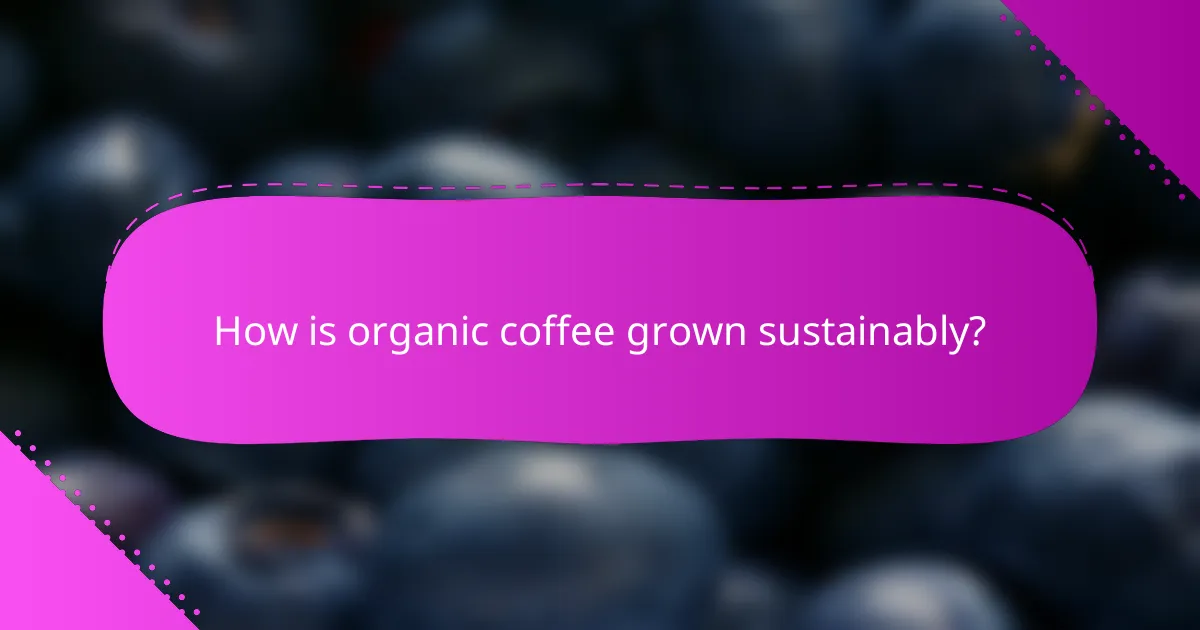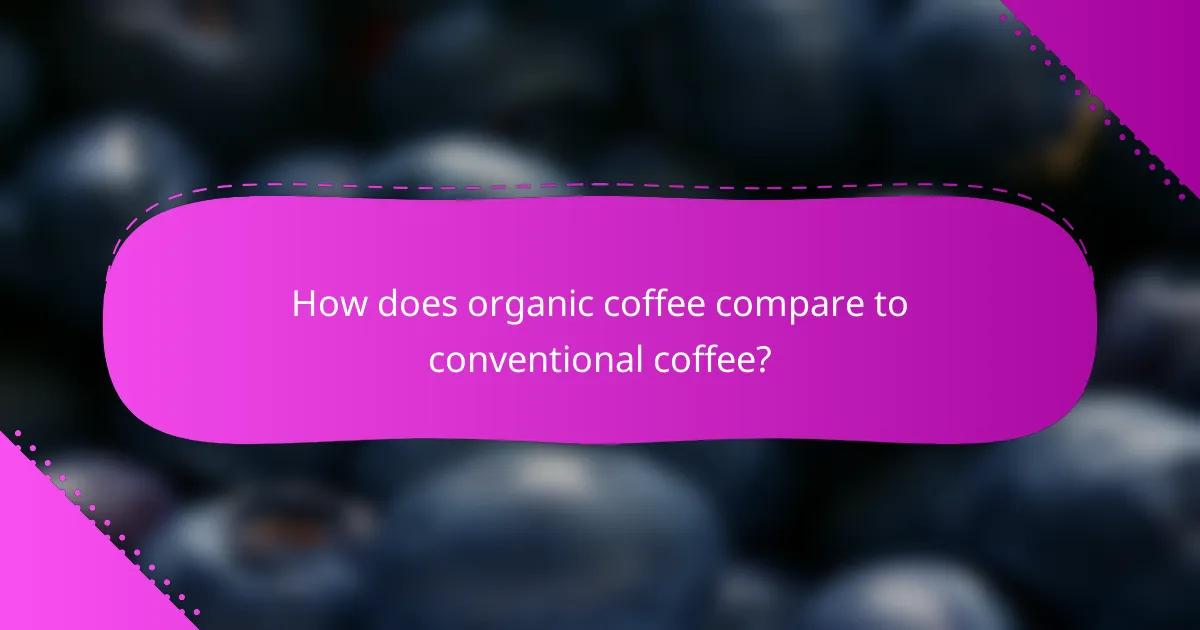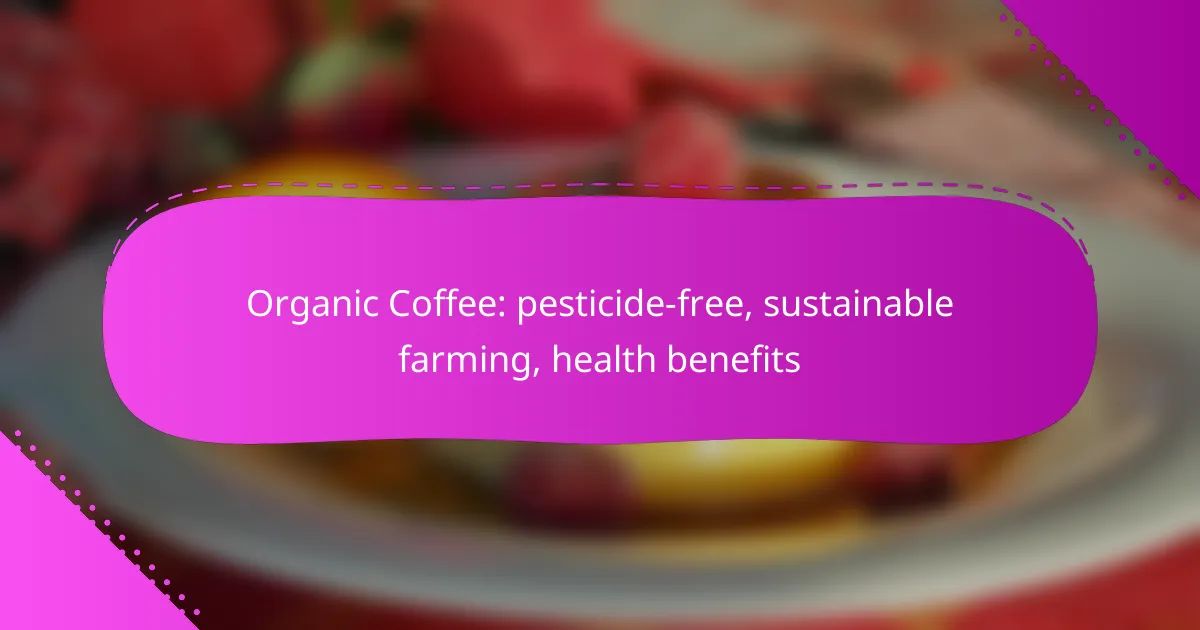Organic coffee is cultivated without synthetic pesticides, making it a healthier choice for consumers and the environment. By employing sustainable farming practices, it promotes biodiversity and conserves natural resources. Many people experience enhanced well-being and mental clarity when opting for organic coffee, which also boasts higher nutrient content compared to conventional varieties.

Where to buy organic coffee in New Zealand?
In New Zealand, you can find organic coffee at various locations, including online retailers, local cafes, and specialty grocery stores. Each option offers unique selections and pricing, making it easy to choose the best source for your needs.
Online retailers like Trade Me
Online platforms such as Trade Me provide a convenient way to purchase organic coffee from various sellers. You can compare prices, read reviews, and often find unique blends that may not be available in stores.
When buying online, consider checking the seller’s ratings and the product’s certification to ensure it meets organic standards. Look for options that offer free shipping or bulk discounts to save on costs.
Local cafes offering organic options
Many cafes across New Zealand now feature organic coffee on their menus, catering to health-conscious consumers. These establishments often source their beans from local roasters who prioritize sustainable practices.
Visiting a cafe allows you to taste different varieties and ask baristas for recommendations. Look for cafes that display their organic certifications or provide information about their sourcing practices to ensure quality.
Specialty grocery stores
Specialty grocery stores are excellent places to find a curated selection of organic coffee brands. These stores often carry both whole beans and ground options, allowing you to choose based on your brewing preferences.
When shopping at these stores, check for certifications on the packaging and consider trying smaller brands that focus on ethical sourcing. Many stores also offer loyalty programs that can help you save money on future purchases.

What are the health benefits of organic coffee?
Organic coffee offers several health benefits, primarily due to its pesticide-free cultivation and higher nutrient content. Consumers often report improved well-being and mental clarity when choosing organic options over conventional coffee.
Lower levels of harmful chemicals
Organic coffee is grown without synthetic pesticides and fertilizers, which means it typically contains lower levels of harmful chemicals. This reduction can lead to fewer health risks associated with chemical exposure, such as certain cancers and hormonal disruptions.
Choosing organic coffee can be particularly beneficial for those sensitive to chemicals or looking to minimize their overall chemical intake. Look for certifications like USDA Organic to ensure the coffee meets strict organic standards.
Higher antioxidant content
Organic coffee often has a higher antioxidant content compared to its non-organic counterparts. Antioxidants help combat oxidative stress in the body, which can contribute to chronic diseases and aging.
Research suggests that organic coffee beans may retain more of their natural antioxidants due to the absence of chemical processing. This can enhance the health benefits you receive from each cup, making it a smart choice for health-conscious consumers.
Potential for improved mental clarity
Many people report improved mental clarity and focus after consuming organic coffee. The absence of chemical residues may contribute to a cleaner energy boost, allowing for better cognitive function without the jitters often associated with conventional coffee.
To maximize these benefits, consider brewing your organic coffee using methods that preserve its natural oils and flavors, such as a French press or pour-over. This can enhance both the taste and the health benefits of your daily cup.

How is organic coffee grown sustainably?
Organic coffee is grown sustainably by utilizing methods that protect the environment and promote biodiversity. This includes avoiding synthetic pesticides and fertilizers, conserving water, and implementing practices that enhance the ecosystem.
Use of natural fertilizers
Natural fertilizers, such as compost and manure, enrich the soil without introducing harmful chemicals. These organic materials improve soil structure and promote healthy microbial activity, which is essential for nutrient absorption by coffee plants.
Farmers often rotate crops and incorporate cover crops to enhance soil fertility naturally. This approach not only supports coffee growth but also reduces dependency on external inputs, making farming more sustainable.
Water conservation techniques
Water conservation is critical in sustainable coffee farming, especially in regions prone to drought. Techniques such as drip irrigation and rainwater harvesting help minimize water usage while ensuring that coffee plants receive adequate moisture.
Farmers may also implement soil moisture monitoring systems to optimize irrigation schedules, reducing waste and improving water efficiency. These practices are essential for maintaining healthy coffee crops while protecting local water resources.
Shade-grown practices
Shade-grown coffee is cultivated under a canopy of trees, which provides a natural habitat for wildlife and helps maintain biodiversity. This method reduces the need for chemical inputs and protects the coffee plants from extreme weather conditions.
By promoting shade-grown practices, farmers can enhance the quality of their coffee while contributing to environmental sustainability. This approach not only benefits the ecosystem but can also lead to higher market prices for premium organic coffee.

What certifications should organic coffee have?
Organic coffee should have certifications that verify its compliance with specific agricultural standards, ensuring it is grown without synthetic pesticides and fertilizers. Key certifications include USDA Organic, Fair Trade, and Rainforest Alliance, each focusing on different aspects of sustainability and ethical practices.
USDA Organic certification
The USDA Organic certification guarantees that coffee is produced according to strict federal guidelines, which prohibit the use of synthetic pesticides, herbicides, and fertilizers. To qualify, farms must undergo a rigorous inspection process and maintain organic practices for at least three years.
When purchasing USDA Organic coffee, look for the USDA seal on the packaging. This indicates that the product meets the standards for organic farming, which can enhance both environmental sustainability and health benefits for consumers.
Fair Trade certification
Fair Trade certification focuses on ensuring that coffee farmers receive fair compensation for their products, promoting equitable trading conditions. This certification supports sustainable farming practices and aims to improve the livelihoods of farmers in developing countries.
When you choose Fair Trade certified coffee, you contribute to community development initiatives and environmental sustainability. Look for the Fair Trade logo on packaging to ensure your coffee supports ethical practices.
Rainforest Alliance certification
The Rainforest Alliance certification emphasizes environmental conservation and sustainable farming practices. Coffee farms that achieve this certification must demonstrate responsible land use, biodiversity protection, and fair treatment of workers.
Choosing Rainforest Alliance certified coffee helps support sustainable agriculture that protects ecosystems and promotes the welfare of farming communities. Look for the Rainforest Alliance frog logo to identify products that adhere to these standards.

How does organic coffee compare to conventional coffee?
Organic coffee differs from conventional coffee primarily in its farming practices and the absence of synthetic pesticides. This results in a product that is often perceived as healthier and more environmentally friendly.
Differences in pesticide use
Organic coffee is grown without synthetic pesticides or fertilizers, adhering to strict regulations that promote natural farming methods. In contrast, conventional coffee farming frequently employs chemical treatments to manage pests and enhance yields, which can leave residues on the beans.
For consumers, this means organic coffee is less likely to contain harmful chemicals, making it a safer choice for health-conscious individuals. Additionally, organic farming practices often lead to healthier soil and ecosystems.
Flavor profile variations
The flavor profile of organic coffee can differ significantly from conventional coffee due to the absence of chemical fertilizers and pesticides. Many coffee enthusiasts claim that organic coffee has a more complex and nuanced flavor, often described as richer and more aromatic.
Factors such as the specific growing conditions and the coffee variety also play a crucial role in flavor. While some may prefer the taste of organic coffee, others might not notice a substantial difference, emphasizing the importance of personal preference.
Environmental impact considerations
Organic coffee farming practices are designed to minimize environmental harm, promoting biodiversity and reducing pollution. By avoiding synthetic chemicals, organic farms help maintain healthier ecosystems and protect water sources from contamination.
Conventional coffee farming, on the other hand, can contribute to soil degradation and water pollution due to chemical runoff. Choosing organic coffee supports sustainable farming practices that benefit both the environment and local communities.
